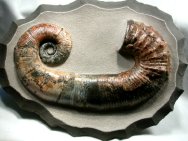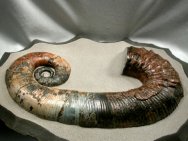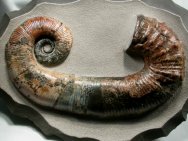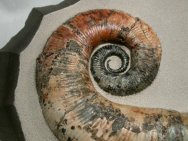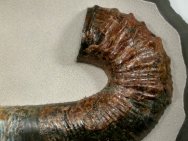Name: Ammonita;
Pleuroceratidae; Audoliceras sp. Phylum
Mollusca, Class Cephalopoda, Subclass
Ammonoidea, Order Ammonitida
Geological
Time: Cretaceous Aptian Stage (~120 million years ago)
Size (25.4
mm = 1 inch): 205 mm across on a 190 mm by 260 mm base.
Fossil Site:
Volga River Region, Saratov, Russia
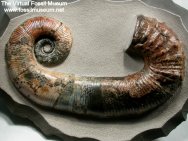 This
is an ammonite of the genus Audoliceras coming from Cretaceous,
Aptian Stage (120 m.y.a) deposits of Russia. It has what is known
as heteromorph shape. While most ammonites have spiral shells that
retain the same shape throughout growth (homomorph), a major group
of ammonites, the Ancyloceratina, emerged during the Late Jurassic
that had uncoiled shells; they were named heteromorphs, meaning
different-shaped. While little is known of their mode of life, their
uncoiled shells would have hindered fast swimming. They may have
wobbled their way through the water column without spread tentacles,
grapping whatever prey came within their reach. As with all other
ammonites, the heteromorphs went extinct at the end of the Cretaceous. This
is an ammonite of the genus Audoliceras coming from Cretaceous,
Aptian Stage (120 m.y.a) deposits of Russia. It has what is known
as heteromorph shape. While most ammonites have spiral shells that
retain the same shape throughout growth (homomorph), a major group
of ammonites, the Ancyloceratina, emerged during the Late Jurassic
that had uncoiled shells; they were named heteromorphs, meaning
different-shaped. While little is known of their mode of life, their
uncoiled shells would have hindered fast swimming. They may have
wobbled their way through the water column without spread tentacles,
grapping whatever prey came within their reach. As with all other
ammonites, the heteromorphs went extinct at the end of the Cretaceous.
Also
see: Ammonite Fossils |
|

